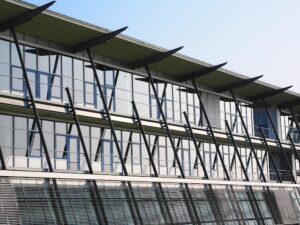Clean tech is making non-domestic buildings more energy efficient

Photo by Pixabay
According to available data from the Carbon Trust, small to average-sized businesses in the UK generate around 15 tonnes of CO2 equivalent (tCO2e) each year. Thankfully, increasing concerns about climate change push the need to transition to sustainable energy consumption practices. Today, the UK is embracing new ways to improve energy efficiency by setting out a national clean energy policy (Net Zero) to ensure full decarbonisation by 2050. Clean technology is helping in the achievement of these energy efficiency goals by reducing carbon emissions from non-domestic buildings in various ways.
One noticeable way clean tech makes commercial real estate more energy-efficient is the availability of energy storage. Most non-domestic properties are now investing in energy storage solutions in the form of large lithium-ion batteries to store the energy they collect. This significantly reduces energy costs when paired with other renewable energy generation methods. Not only do these buildings enjoy clean energy, but they also experience more stable electrical grids, which is crucial for business productivity. The best part is energy storage is still in its developing stages. Experts expect more advancements and improvements over the coming years, which is great news for commercial real estate owners. Most businesses will now avoid expensive energy bills eating into their production costs.
Commercial buildings can now enjoy proper renewable energy integration with better energy storage solutions. Thanks to clean tech solutions, integrating renewable energy sources like solar panels and wind turbines into these structurs is easier than ever. The level of complication has reduced over time, and commercial buildings no longer have to rely on traditional grid power. Also, most renewable energy systems generate electricity on-site. That means businesses that want to lower their carbon footprints can harness clean and sustainable energy all year round.
Monitoring a building’s energy efficiency is becoming increasingly important, which is one of the reasons why building owners are required to obtain Commercial Energy Performance Certificates or Commercial EPC to show how energy efficient their properties are. Here also, Cleantech, is playing a massive role, as it allows for easy monitoring and analysis of a property’s energy efficiency. Commercial buildings can now benefit from real-time energy monitoring and analytics from the right platforms. These analytic tools allow property and facility managers to track energy consumption patterns. This makes it easier to identify energy inefficiency or overuse areas and implement the right targeted energy-saving measures. Commercial real estate owners can then implement the right strategies to reduce energy waste, optimise production, and enhance overall energy efficiency.
Clean tech is also promoting the use of AI-powered windows with the help of smart glasses. Commercial buildings that install smart glasses in their window panes have greater remote control over daylight, heat, and glare. Some smart windows can use artificial intelligence to tint their glasses. Doing this can reduce reliance on artificial lighting and air-conditioning.
But AI isn’t limited to smart window glasses alone. Commercial HVAC systems are known to be one of the main culprits of energy inefficiency. Fortunately, automation-driven HVAC can address this challenge efficiently. Commercial buildings fitted with sensors can benefit from AI-powered solutions that improve HVAC systems and enhance energy efficiency with the help of advanced algorithms and data accumulation.

